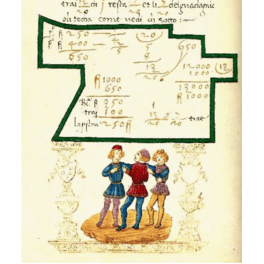About the Project
The “Medieval and Early Modern Mediterranean Mathematics” (MediMath) project aims at providing cutting-edge research on the history of algebra and on its relations to traditional disciplines, such as arithmetic and geometry. The overarching aim of the project is to provide new insights into the history of algebra and of its related disciplines by considering the following:
- the time spanning from the 9th to the beginning of the 17th century as a heterogeneous continuum;
- the actors and cultures of mathematical practices of the extended Mediterranean world as a heterogeneous whole, which is in turn connected to cultures of mathematical practices that flourished in other worlds.
The project aims to overcome the local and fragmented studies (in terms of geographies, time periods, and cultures) of medieval and early modern mathematics by adopting a global approach. Rather than being restricted to the regions surrounding the Mediterranean Sea, MediMath will extend the definition of Mediterranean world, and highlight the multidirectional exchange of knowledge which characterized it. From this perspective, the ultimate goal of the MediMath project is to question our understanding of the concept of the border (geographical, but also linguistic and disciplinary) specifically by emphasizing its porousness and arbitrariness.
Axes of research:
- Conceptual changes: to understand how concepts, operations and notions of the medieval and early modern algebra, arithmetic and geometry were similar, but also how they diverged among different authors and traditions. The key-intermediate goals are therefore to answer transversal questions such as: what is algebra? What is arithmetic? What kind of geometry do the algebraists use?
- Lexicography: to investigate the peculiarities of the language(s) of Mediterranean mathematics, by tracing the history of certain key terms for mathematical concepts and operations across multiple languages.
- Circulation of knowledge: to demonstrate the multilinear nature of the mathematical flows of knowledge in the Mediterranean world.
Finally, interdisciplinarity is a key aspect of the project: combining the history of mathematics with other disciplinary fields (such as philosophy, philology, digital humanities, social and global history) is one of the intellectual challenges that the MediMath project plans to take on.


